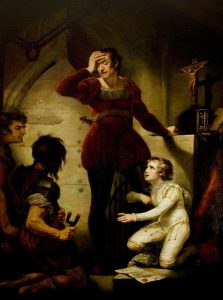Two Talk: Two Gents
by Eleanor Grant | May 13, 2024
Shakespeare put under the well-funded spotlight in Gregory Doran’s new production.

Was Sir Gregory Doran, Former artistic director of the Royal Shakespeare Company, trying to avoid directing The Two Gentlemen of Verona? He’s directed every other Shakespeare in his dazzling career. “No, it wasn’t avoidance, there were just other priorities,” he reflects. “Well, maybe I avoided it.” It’s an odd play. But he avers that it’s his current favourite. Gregory Doran, longtime director of the RSC and ‘one of the great Shakespearians of his generation’, is professionally profound. He’s ridiculously sharp, knows his business, and he’s the current ‘Cam Mac’ Visiting Professor of Contemporary Theatre here at Oxford.
I arrive at the rehearsal space for the upcoming production of Two Gentlemen to interview him. We sit down. Sorry, sorry —we get up —someone else has their tute in the rehearsal space. Theatre is somewhat peripheral to this university: nonetheless, Oxford does furnish its visiting directors with a flashy sum of flash cash, enabling a high level of professionalism. The upcoming production of Two Gents has been brewing a while: auditions were first advertised in June, and the score is entirely student composed. It’s a big operation.
But The Two Gentlemen of Verona is a particularly apt choice for a student play. It’s “about young people, leaving home for the first time… going out into the big wide world, and falling in love and making horrible mistakes!” The students are some of the youngest actors Doran has worked with. Having been at the RSC for nearly 40 years, many actors under his direction were the crop of drama schools. But after the auditions for Two Gents, he knew he couldn’t have captured that same youthfulness from a trained actor. For the leading part of Proteus, he claims, even experienced auditionees a couple of years above had already lost a kind of rawness. “There’s something completely riveting about it.”
Having said that, Oxford students are less natural in some dramatic endeavours: “there’s no challenge in understanding the meaning of the text but getting it physically into their bodies is a different set of muscles.” The tendency to over-intellectualise Shakespeare is part of the reason Doran is doing a production, rather than lectures, with his professorship. Luckily, it’s not hard to avoid intellectualising Shakespeare’s first play: there’s not that much critical stuff on it.
Even when he first entered the industry, university students were too cerebral about their acting, and had a chip on their shoulder about “this thing called technique” which drama students had been coached in. Schools teach you the business of being an actor, “but I don’t think you need to go to be one.” Doran himself studied English and drama at Bristol, although doesn’t reckon he did much of the English Literature half. This seems a fair parallel to the cast of Two Gents: “at least five,” Doran chuckles, “are doing their final exams in production week.”
He’s found it wonderful to work with the students, however, fostering a genuine collaboration. Doran cites a “pretty tedious” scene he was going to cut before the cast reinterpreted it in a modern light, as akin to online dating. Analogously, it turned out during one rehearsal that three of the cast members actually do drag (“no, it’s not actually that common among drama students in my experience”). Doran decided to do something with this, dreaming up a cross-dressing, exuberantly anachronistic drag scene set in Milan… “the Duke sings Mambo Italiano” and “there is suddenly colour and glitz and glam.” But it also shifts the dynamics of the play, and the troupe has really considered what this means for the characters onstage. “Maybe, you know, to become the Duke of Milan, he’s had to compromise his own sexuality.” The text is joyously freed under Doran’s directorship.
Indeed, he has overseen pyrotechnically brilliant transpositions of Shakespeare’s work. From Freud’s Vienna to Sicily during the Abyssinian crisis, Doran has a keen eye for the historical circumstances that resonate with Shakespeare’s human—all too human—plays. In Two Gents, Doran didn’t want the original context to feel distant, or for Sylvia to be some kind of droopy heiress. It is, after all, about as obscure as Shakespeare gets, and hasn’t found its way into pop culture like Romeo and Juliet. Doran has pepped it up with some clever historico-cultural manoeuvres… to find out the changes, of course, you’ll have to nab some tickets.
I’m interested in what significance Gentlemen and Verona have to Doran. He elaborates:
a) The meaning of Gentlemen is left in question by the end of the play. The script includes some material that has been seen as problematic or simply bizarre by various critics, including a near-rape scene. Doran, however, suggests this material is actually reflective of fraught modern gender relations. Proteus announces, in a chillingly modern line, that “women cannot love where they’re beloved”: it’s an incel mentality. We shouldn’t ignore a play that confronts us with entitled men and swiftly silenced women. “This is entirely a contemporary issue.” Doran argues this logic is applicable to other troublesome Shakespearian texts, such as the Merchant of Venice: “I think it’s a play about anti-Semitism, not an anti-Semitic play.”
b) Verona, to Doran, denotes the “backwater which these two men leave behind”: Doran draws a comparison to his “own” Verona, his hometown of Preston. “I left Preston behind me.” Preston, Lancashire, it known for its ’60s bus stop. Doran drily comments that the most iconic landmark in the city was his means of getting out.
To put on a production is to produce, generate, dance above the text. “I don’t think there’s any such thing as a definitive Shakespeare production, it’s just groups of people in a certain time” creatively grappling with the words. Doran does not seek complete fidelity to Shakespeare’s texts, cutting a few “unhelpful” or politically incorrect lines. “I think you have to negotiate each moment that it happens and remember that actually you just have the option to cut it.” He doesn’t have to shepherd each and every line like lost sheep. He may whittle at will.
In a spirit both modern and Shakespearian, Doran has employed some gender swaps in Two Gents, and has also ensured a gender-balanced cast. “It means that we’ve got a lot of female outlaws,” but has also resulted in meaningful switches, such as substituting Proteus’ father figure with a mother. “It makes you think: ‘now what is the context of that?'” Doran has done this before. “I did the first gender-balanced Shakespeare at Stratford. And I chose Troilus and Cressida because, in a way, it was the most male-dominated play.”
He has a serious gift for mediating Shakespeare to modern audiences, and making it feel less intimidating. He speaks of one student who approached him at the end of a talk and said: “I’ve always been very wary about Shakespeare, because it didn’t seem like it was something to do with me… but you’ve made me feel like I’ve got a connection. I think this play is about today.” That “today” is nearly a year ago now, and that student has joined the troupe. Rehearsals are ramping up; time is marching onward; and no matter how Doran theatrically reconfigures Shakespeare’s works, “underpinning it all has to be the craft of Shakespeare.”
“Well, it’s been a joy, to be absolutely hand-on-heart honest.” Right on.
Tickets are on sale now. Save culture today.∎
Words by Eleanor Grant. Image licensed under Getty Images Entertainment, rights managed, full editorial rights UK. Photo courtesy of Ben Gabbe, 2016.




